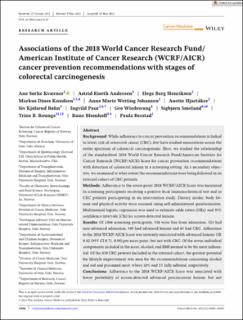| dc.contributor.author | Kværner, Ane Sørlie | |
| dc.contributor.author | Andersen, Astrid Riseth | |
| dc.contributor.author | Henriksen, Hege Berg | |
| dc.contributor.author | Knudsen, Markus Dines | |
| dc.contributor.author | Johansen, Anne Marte Wetting | |
| dc.contributor.author | Hjartåker, Anette | |
| dc.contributor.author | Bøhn, Siv Kjølsrud | |
| dc.contributor.author | Paur, Ingvild | |
| dc.contributor.author | Wiedswang, Gro | |
| dc.contributor.author | Smeland, Sigbjørn | |
| dc.contributor.author | Rounge, Trine Ballestad | |
| dc.contributor.author | Blomhoff, Rune | |
| dc.contributor.author | Berstad, Paula | |
| dc.date.accessioned | 2023-09-04T09:08:37Z | |
| dc.date.available | 2023-09-04T09:08:37Z | |
| dc.date.created | 2023-06-11T12:39:46Z | |
| dc.date.issued | 2023 | |
| dc.identifier.issn | 2045-7634 | |
| dc.identifier.uri | https://hdl.handle.net/11250/3087256 | |
| dc.description.abstract | Background: While adherence to cancer prevention recommendations is linked to lower risk of colorectal cancer (CRC), few have studied associations across the entire spectrum of colorectal carcinogenesis. Here, we studied the relationship of the standardized 2018 World Cancer Research Fund/American Institute for Cancer Research (WCRF/AICR) Score for cancer prevention recommendations with detection of colorectal lesions in a screening setting. As a secondary objective, we examined to what extent the recommendations were being followed in an external cohort of CRC patients. Methods: Adherence to the seven-point 2018 WCRF/AICR Score was measured in screening participants receiving a positive fecal immunochemical test and in CRC patients participating in an intervention study. Dietary intake, body fatness and physical activity were assessed using self-administered questionnaires. Multinomial logistic regression was used to estimate odds ratios (ORs) and 95% confidence intervals (CIs) for screen-detected lesions. Results: Of 1486 screening participants, 548 were free from adenomas, 524 had non-advanced adenomas, 349 had advanced lesions and 65 had CRC. Adherence to the 2018 WCRF/AICR Score was inversely associated with advanced lesions; OR 0.82 (95% CI 0.71, 0.94) per score point, but not with CRC. Of the seven individual components included in the score, alcohol, and BMI seemed to be the most influential. Of the 430 CRC patients included in the external cohort, the greatest potential for lifestyle improvement was seen for the recommendations concerning alcohol and red and processed meat, where 10% and 2% fully adhered, respectively. Conclusions: Adherence to the 2018 WCRF/AICR Score was associated with lower probability of screen-detected advanced precancerous lesions, but not CRC. Although some components of the score seemed to be more influential than others (i.e., alcohol and BMI), taking a holistic approach to cancer prevention is likely the best way to prevent the occurrence of precancerous colorectal lesions. | |
| dc.description.abstract | Associations of the 2018 World Cancer Research Fund/American Institute of Cancer Research (WCRF/AICR) cancer prevention recommendations with stages of colorectal carcinogenesis | |
| dc.language.iso | eng | |
| dc.subject | Kreft i tykktarm og endetarm | |
| dc.subject | Colorectal cancer | |
| dc.title | Associations of the 2018 World Cancer Research Fund/American Institute of Cancer Research (WCRF/AICR) cancer prevention recommendations with stages of colorectal carcinogenesis | |
| dc.title.alternative | Associations of the 2018 World Cancer Research Fund/American Institute of Cancer Research (WCRF/AICR) cancer prevention recommendations with stages of colorectal carcinogenesis | |
| dc.type | Peer reviewed | |
| dc.type | Journal article | |
| dc.description.version | publishedVersion | |
| dc.subject.nsi | VDP::Forebyggende medisin: 804 | |
| dc.subject.nsi | VDP::Preventive medicine: 804 | |
| dc.source.journal | Cancer Medicine | |
| dc.identifier.doi | 10.1002/cam4.6119 | |
| dc.identifier.cristin | 2153479 | |
| cristin.ispublished | true | |
| cristin.fulltext | original | |
| cristin.qualitycode | 1 | |
